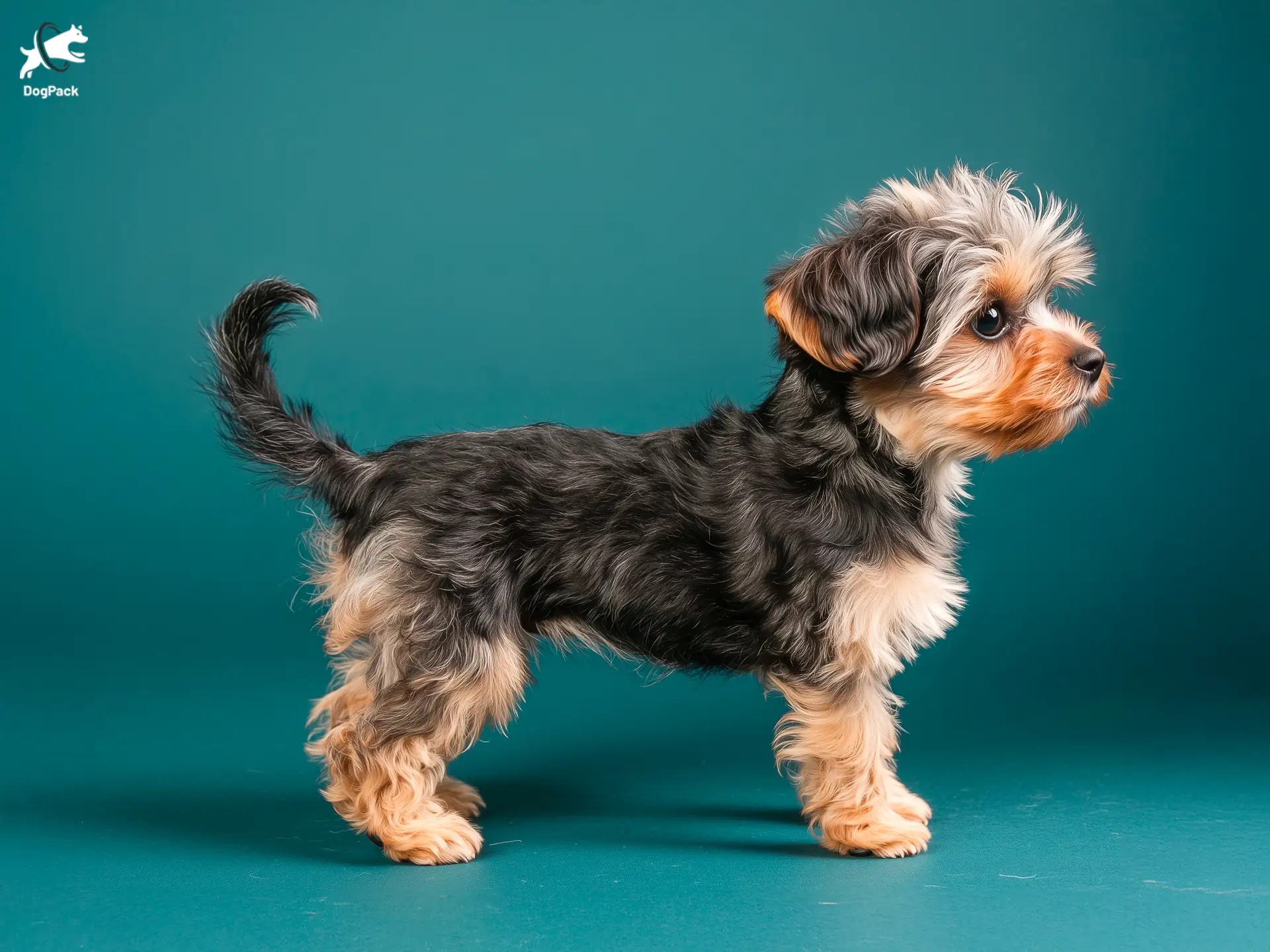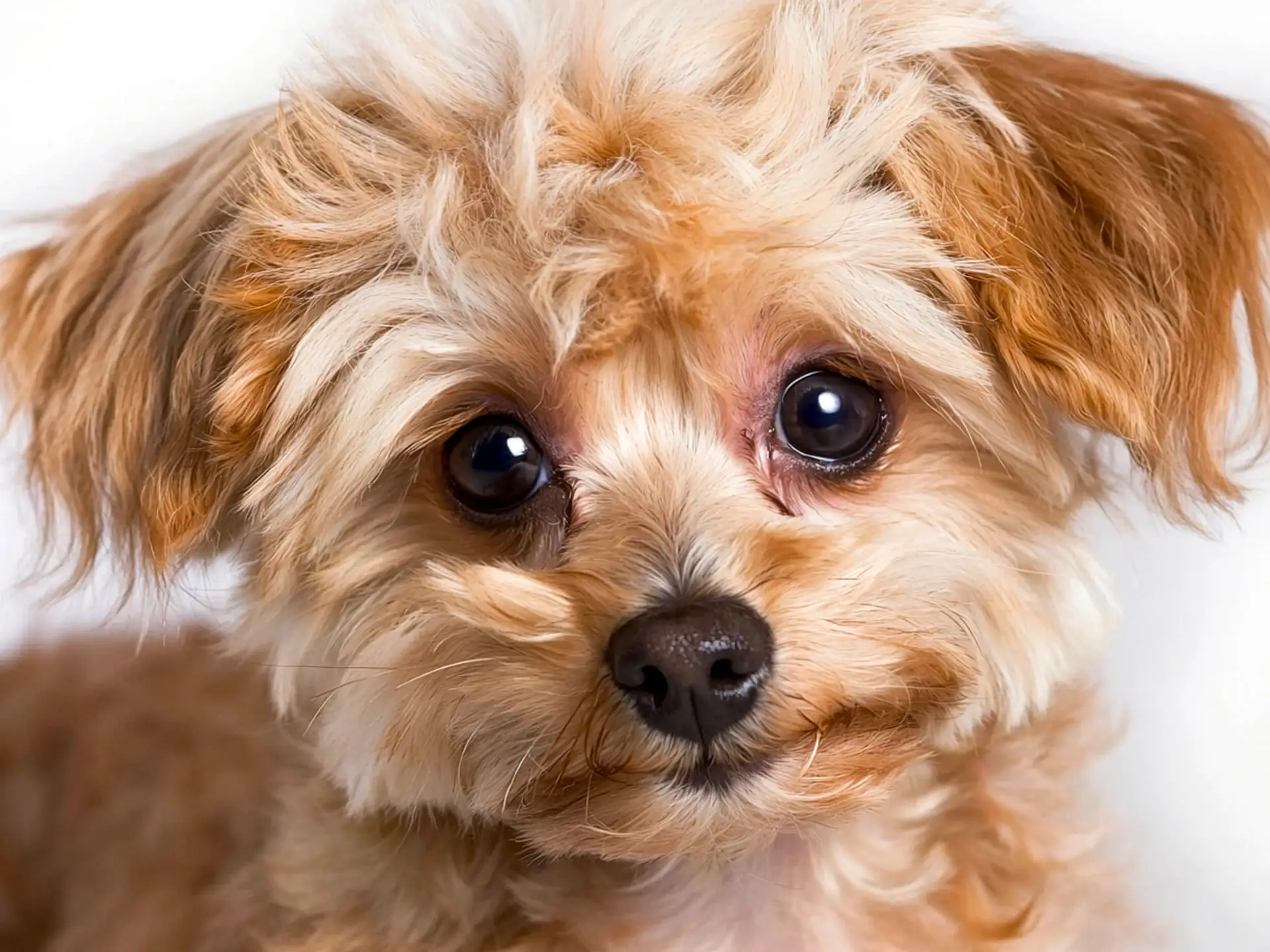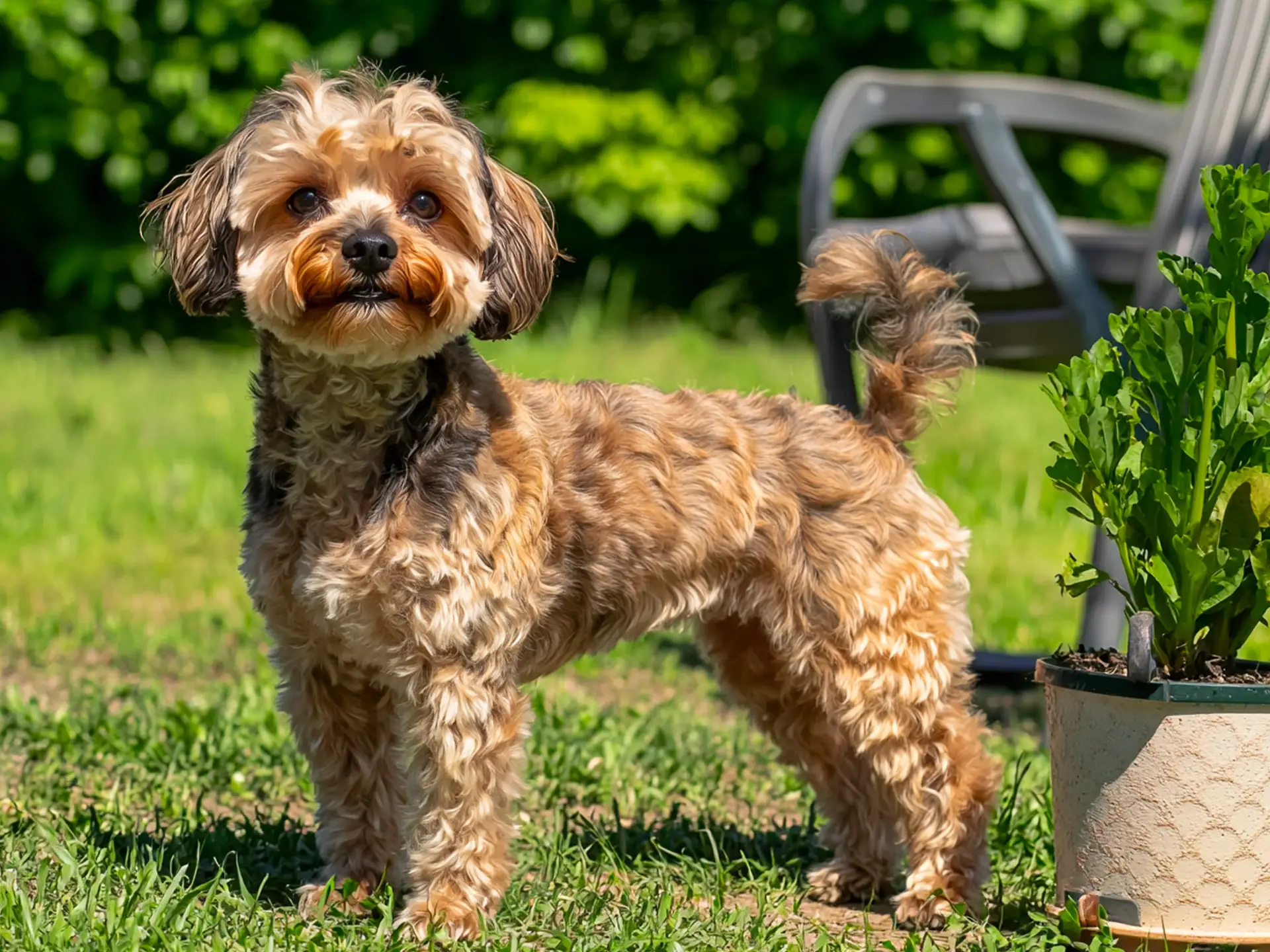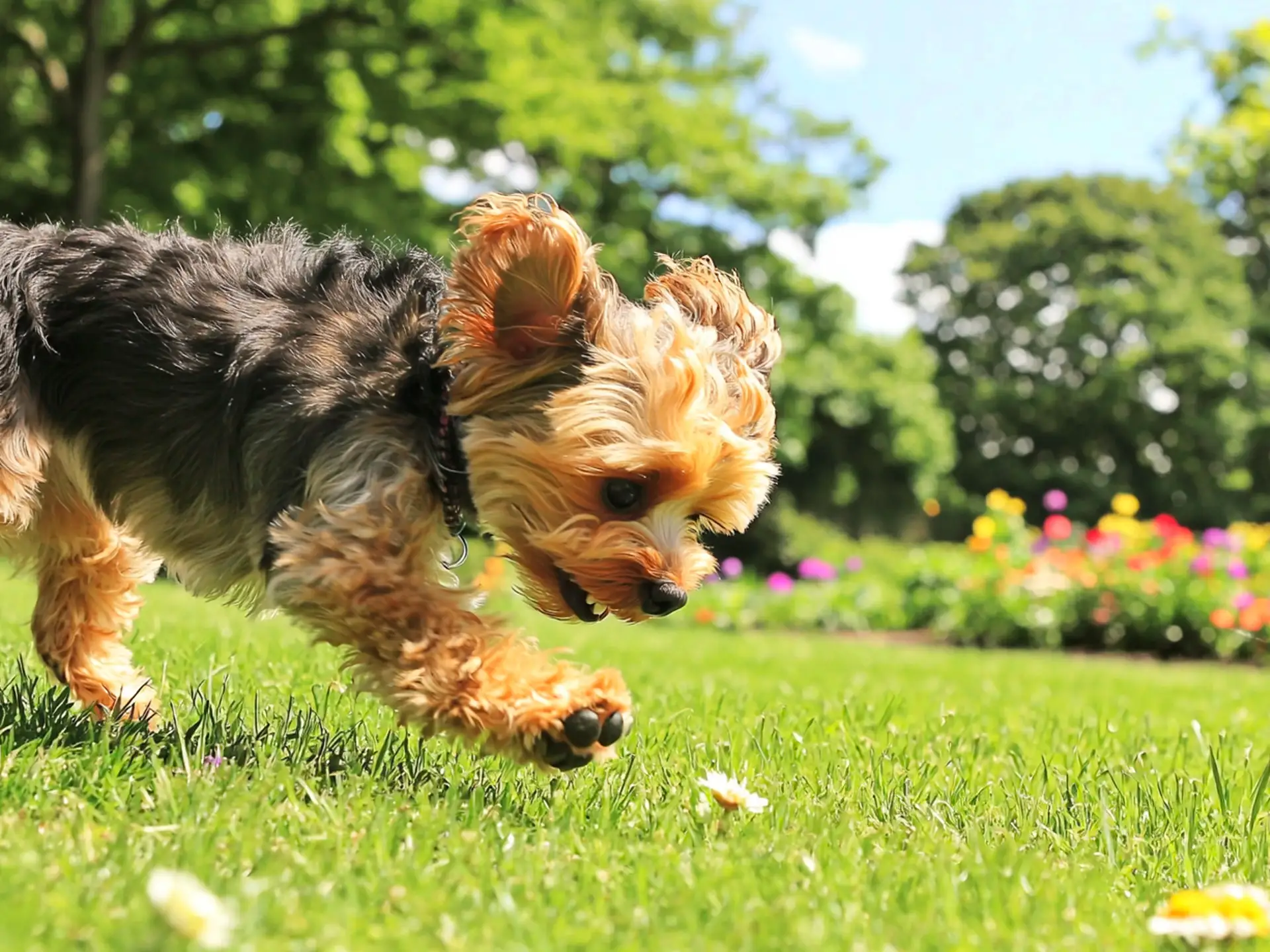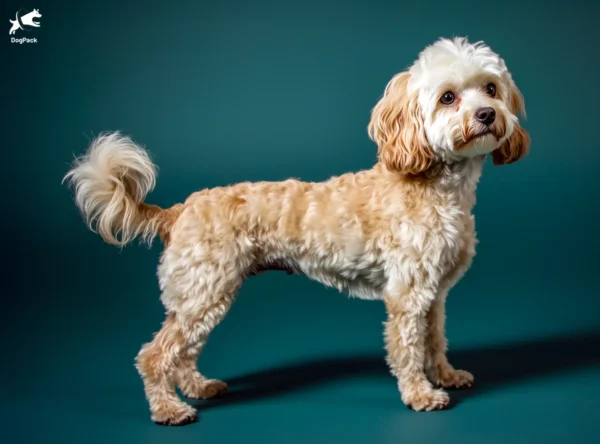Yorkiepoo Dog Breed Info & Overview
Meet the Yorkiepoo, a delightful cross between the Yorkshire Terrier and a Poodle. Known for its spunky energy, curly coat, and keen intelligence, this playful hybrid captures hearts everywhere it goes. With a low-shedding coat and a big personality in a small package, these pups are adored for their adaptability and devotion to their families.
Characteristics
Pictures
Breed History
While the exact origins of many designer breeds are murky, the Yorkiepoo likely emerged in the United States around the early 2000s. Breeders aimed to combine the Yorkshire Terrier’s feisty spirit with the Poodle’s intelligence, resulting in a charming companion. The popularity of designer dog breeds soared as families sought small, hypoallergenic pets.
Many credit the breed’s rise to the wave of ‘Poodle crosses’ that capitalized on the Poodle’s hypoallergenic coat and trainable nature. As toy dog enthusiasts discovered the perfect blend of the Yorkshire Terrier’s confidence and the Poodle’s unwavering loyalty, interest in crossbreeding surged. Over time, the breed developed into a beloved lapdog with fans worldwide.
Today, enthusiasts appreciate these pups for their small size, minimal shedding, and bright personalities. While not formally recognized by major kennel clubs, they have found a home in the hearts of dog lovers seeking a playful, affectionate companion. The cross continues to evolve, showcasing how selective breeding can craft unique traits that delight countless families.
Temperament, Personality
Lively and brimming with curiosity, these dogs are known to greet each day with tail-wagging enthusiasm. Their social nature means they often bond closely with one person or the entire family, seeking constant interaction and admiration. Early socialization is crucial, as a well-adjusted pup grows into a confident companion that can adapt to various environments.
Despite their tiny stature, they harbor a big-dog attitude inherited from their terrier lineage. They can be protective of their owners and bark at perceived threats, though usually more out of alertness than aggression. Patience and positive reinforcement help channel this watchful temperament into polite behavior, making them a joy in homes with children.
The Yorkiepoo’s eagerness to please shines when interacting with other pets, but they may need careful introductions to avoid overwhelming smaller animals. Keeping sessions short and supervised encourages healthy relationships. Overall, they thrive as interactive companions who welcome fresh experiences, bringing a spirited dash of fun to families craving a clever, cuddly canine friend.
Physical Characteristics
Most weigh between five and fifteen pounds, making them easy to tote around. With a petite frame and a soft, wavy or curly coat, they possess undeniable charm. Coat colors vary widely, ranging from solid black or brown to eye-catching mixes of silver, cream, and parti patterns that show off their fun-loving spirit.
Ears can be floppy or semi-erect, emphasizing their alert expression. A moderate muzzle and dark, inquisitive eyes give them an endearing look many owners can’t resist. Their tail may be left natural or docked—practices vary by region. Regardless of these differences, each pup exudes a lively grace that stands out among small dog breeds.
The Yorkiepoo typically sports a lightweight build, perfect for owners seeking a delicate companion that’s still sturdy enough for gentle play. They often maintain a puppy-like appearance well into adulthood, thanks to their expressive faces. No matter the variation, these dogs inspire affectionate smiles wherever they wander, proving that good things do come in small packages.
Health Issues
Though generally robust, this cross may inherit issues from both parent breeds, such as patellar luxation or hip dysplasia. Regular vet check-ups and early screening can prevent minor problems from becoming severe. Meanwhile, dental care is crucial because smaller jaws often lead to crowded teeth, increasing the likelihood of tartar buildup and gum disease.
Tracheal collapse is another condition to watch, where the windpipe weakens and narrows. Ensuring your pup maintains a healthy weight and using a harness instead of a collar can help reduce pressure on the airway. Regular wellness exams track emerging concerns early, so owners can adjust care strategies to support overall vitality.
Occasional ear infections might crop up due to the breed’s floppy ears, which can trap moisture. Cleaning ears routinely with vet-approved solutions helps reduce the risk of bacterial overgrowth. By staying vigilant about vaccinations, parasite prevention, and weight management, Yorkiepoo parents can provide their companions with a solid foundation for a long, happy life.
Grooming Needs
Thanks to their low-shedding coat, these dogs can be ideal for individuals sensitive to pet dander. However, consistent brushing at least three times a week is essential to prevent tangles or matting, especially around the ears and belly. Many owners opt for a professional trim every six to eight weeks to keep that teddy-bear look in top shape.
Bathing every month or so maintains coat cleanliness without stripping natural oils. Always use a gentle, dog-specific shampoo to avoid dryness or irritation. Because tear staining can occur around the eyes, wiping the face gently each day helps keep them looking fresh and reduces the chance of bacteria buildup.
Nail trims are vital, as overgrown nails can cause pain or alter gait. Cleaning and checking their ears every week reduce the risk of infection, and daily toothbrushing fights plaque. By following a regular routine, owners preserve a Yorkiepoo’s silky coat and overall hygiene, ensuring they’re as delightful to cuddle as they appear.
Exercise Requirements
A brisk walk around the neighborhood or a short play session indoors usually keeps them content, as they can burn energy quickly. Despite their enthusiasm, they don’t need marathon runs or intense workouts. Interactive toys and puzzle feeders provide mental stimulation that prevents boredom and helps them stay sharp. Short bursts of supervised backyard romps also help maintain their healthy weight.
Structured exercise not only strengthens muscles but also curbs potential behavioral issues like excessive barking or restlessness. Splitting activity into two daily sessions suits their small bodies well. Incorporating agility tunnels or fetch games in safe, enclosed spaces taps into their playful side, encouraging bonding with their human family. Balancing fun and rest is the key to a well-adjusted companion.
In more urban settings, they adapt nicely to apartment living if given daily strolls and occasional park visits. Keep an eye on stamina, as overly enthusiastic games can wear them out. Always tailor exercise levels to the dog’s age and health status, ensuring gentle progression. For the Yorkiepoo, consistent engagement trumps intense exertion when it comes to staying fit and happy.
Training Tips
With a knack for learning, these pups respond best to gentle, reward-based methods rather than harsh corrections. Short, engaging sessions leveraging treats or praise yield the most success. Start with basic commands—sit, stay, come—then progress to advanced tricks once they’ve mastered the fundamentals. Consistency and patience ensure a positive association with the learning process.
Because of their terrier heritage, they can sometimes show stubborn streaks if they sense you’re not in charge. Setting clear boundaries from day one helps curb bossy or possessive behaviors. Gradual crate training fosters a sense of security and keeps them out of trouble when unsupervised. Combining structure with compassion builds a well-rounded companion.
Early socialization is equally vital, exposing them to different people, places, and other pets in a positive manner. Puppy classes or supervised playdates refine manners, especially around larger breeds. Occasionally, they might bark at new faces, so reinforcing quiet commands with treats can manage noise levels. Over time, a well-trained dog emerges, ready to greet the world confidently.
Nutrition, Diet
Yorkiepoos typically require around 250 to 400 calories per day, depending on weight and activity level. Select a small-breed formula high in protein from sources like chicken or turkey. This nutrient balance supports their energetic lifestyle, helping maintain lean muscle and a healthy coat. Carbohydrates from sweet potatoes or brown rice supply sustainable energy without overloading their delicate systems.
Divide their daily portion into two meals to prevent blood sugar dips, which can lead to hypoglycemia in small dogs. Measuring each meal ensures they don’t overeat, especially if they earn treats during training. Some owners incorporate fish oil or omega-3 supplements to boost coat health, but always consult your veterinarian for the best approach to supplementation.
Avoid free-feeding or offering table scraps, as these pups can pack on pounds quickly. Monitor their weight monthly and adjust portions as needed to keep them trim. Introducing fresh veggies, like steamed carrots or green beans, supplies extra vitamins while promoting fullness. Overall, the Yorkiepoo thrives on a carefully balanced diet tailored to their size and energy demands.
Adoption, Breeders
Begin by researching rescue organizations dedicated to Poodle mixes or Yorkshire Terrier crosses, as they sometimes have these lively hybrids available. Local shelters often welcome smaller dogs surrendered for various reasons, giving you a chance to provide a loving home. Thoroughly review the group’s adoption process and ask about health screenings or any special needs your prospective companion may have.
For those seeking a breeder, look for reputations built on ethical standards and transparency. Insist on meeting the pup’s parents, reviewing genetic health tests, and touring the facilities for proper sanitation. Steer clear of online classifieds offering unrealistic deals. Instead, consult breed-specific clubs or forums to find recommended breeders who prioritize puppies’ well-being over profit.
Additional resources like Petfinder and Yorkiepoo Nation can help locate available dogs. Prioritize patience in your search to ensure you make a thoughtful choice. By adopting or purchasing a Yorkiepoo from a reputable source, future owners guarantee not just a healthy dog, but also a stable temperament that’s more likely to fit seamlessly into family life.
Family Pet?
These dogs often adore companionship and thrive in households where someone is home frequently. They enjoy curling up on laps just as much as sprinting after squeaky toys, making them versatile for families craving both cuddle and playtime. Their gentle nature typically meshes well with older children, as younger kids might inadvertently handle them too roughly.
In multi-pet homes, they usually get along with friendly cats and other dogs, provided introductions go smoothly. This open-minded attitude contributes to their reputation as a sociable breed. Confident but not overbearing, they’re generally happy to share space, although supervision is vital early on to ensure no boundaries are crossed or anxieties triggered.
A Yorkiepoo can adapt to diverse family lifestyles, from quiet retirees to busy families with older kids. Because of their size, they’re more comfortable indoors but still relish daily explorations outdoors. Show them consistent affection, set boundaries, and they’ll reward you with unwavering loyalty—making them a truly endearing addition to any loving household.
Right For You?
Before bringing one home, consider your time commitments and living space. These pups do best with owners who appreciate frequent interaction and can manage daily grooming. If your schedule demands extended absences, they may feel anxious or resort to nuisance barking. Yet, if you value constant companionship, their affectionate presence might be the perfect fit.
Allergies are often minimized thanks to their low-shedding coats, but no dog is entirely hypoallergenic. If you have severe allergies, spend time around one before adopting to test your reaction. Potential owners should also account for grooming expenses, given that professional trimming may be necessary to maintain their coat’s condition and keep them comfortable.
For individuals or families seeking a playful, loving, and relatively low-maintenance small dog, this hybrid ticks many boxes. Active retirees, singles, or families with gentle children often find this breed’s dynamic energy charming rather than overwhelming. Ultimately, only you can determine if their cuddly demeanor, grooming requirements, and lively personality align with your lifestyle.
Conclusion
Whether you’re drawn to its hypoallergenic reputation or simply enchanted by its bubbly personality, the Yorkiepoo can be an excellent match for those yearning for a small dog with big heart. With consistent training, routine grooming, and plenty of attention, this hybrid thrives in a variety of settings. Ideal for owners who prefer an energetic companion that remains easy to handle, these pups charm just about everyone they meet.
Before committing, ensure your schedule and environment match their needs. If so, you’ll likely gain a devoted friend ready to bring joy, laughter, and unwavering loyalty to your daily life. And if you find them irresistible, you’ll be rewarded with a furry companion that brightens every moment.
FAQs
-
How often should I groom my Yorkiepoo’s ears?
Frequent ear cleaning, typically once weekly, is ideal for the Yorkiepoo. Their floppy ears can trap debris and moisture, leading to infections. Use a vet-approved cleaner and cotton balls to gently remove buildup. Routine checks prevent discomfort and ensure healthy, happy ears.
-
Is a Yorkiepoo suitable for someone with mild dog allergies?
Yes, the Yorkiepoo’s low-shedding coat can help minimize allergic reactions. However, no breed is entirely hypoallergenic. Spend time with one beforehand and consult an allergist to assess how your body responds. Regular grooming further reduces dander buildup, improving overall comfort.
-
Can Yorkiepoos travel well on planes or long car rides?
In general, the Yorkiepoo’s small size makes them portable, and many airlines allow them in-cabin. Gradual crate training fosters security and helps reduce stress during transit. Break up car rides with short pit stops, offering water and reassurance to keep them comfortable.
-
Do Yorkiepoos get along with birds or smaller pets?
While the Yorkiepoo is often friendly with other animals, careful introductions and supervision are essential. Their terrier instincts may spark curiosity or chase tendencies. Gradually desensitize them to each other’s presence, reinforcing calm behavior with treats. Proper socialization ensures a peaceful coexistence.
-
What’s the best way to handle separation anxiety in a Yorkiepoo?
Many Yorkiepoos crave constant companionship, so ease them into alone time with short departures, gradually increasing the duration. Provide a cozy crate with favorite toys and calming scents. Puzzle feeders and background music can distract them, fostering a sense of security while you’re away.
Breed Ratings
This hybrid learns quickly and thrives on mental challenges, making them eager participants in training sessions.
Always ready to romp with toys or join in family fun, they bring a zestful spark to everyday life.
Moderately active, they enjoy frequent mini-playtimes but are equally content snuggling on the couch.
Low-shedding coat suits those with mild allergies, though regular brushing is needed to maintain a healthy coat.
They may chase smaller critters occasionally, but consistent socialization keeps this tendency in check.
Coats require brushing and occasional trims, but their manageable size simplifies bathing and nail care.
Eager to please and quick to learn, though brief attention spans call for engaging, reward-based techniques.
They bond closely with their families and can develop separation anxiety if left alone for too long.
Vocal at times, especially when bored or alerting owners, but consistent training can reduce excessive barking.
Minimal drool, rarely leaving wet spots around the home or on clothing.
Generally sociable with other canines, provided early socialization fosters positive interactions.
Overall robust, but watch for hereditary issues like patellar luxation, tracheal collapse, and dental concerns.

